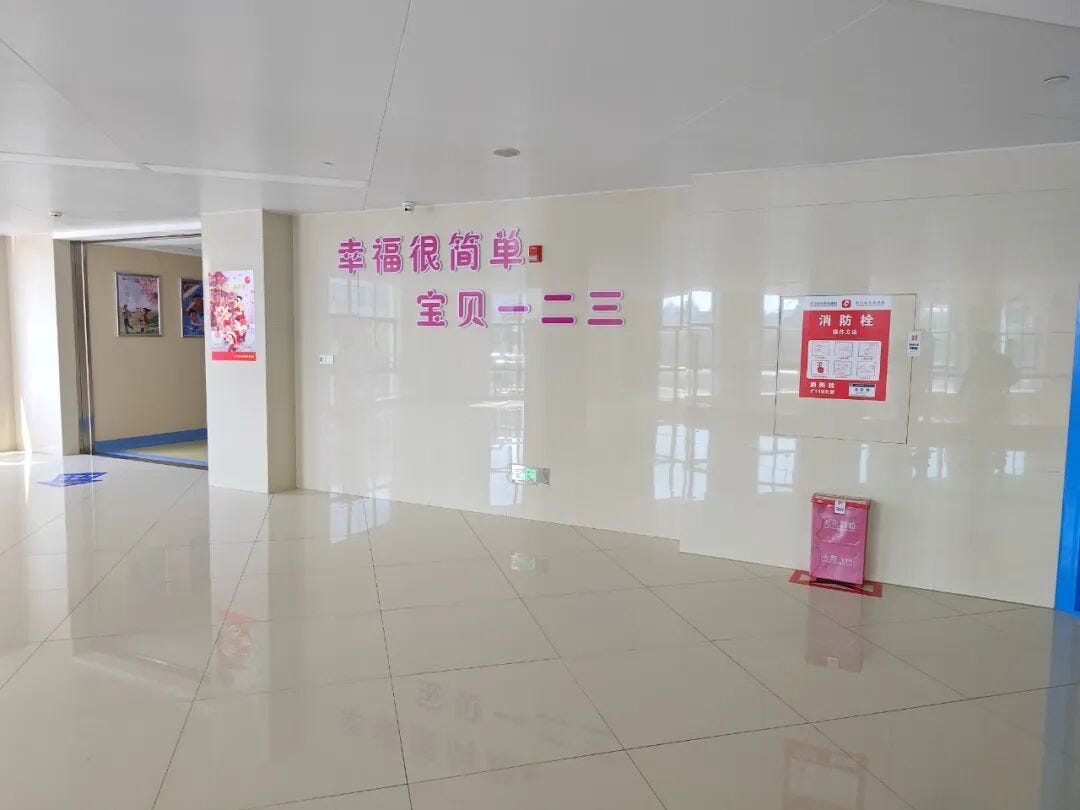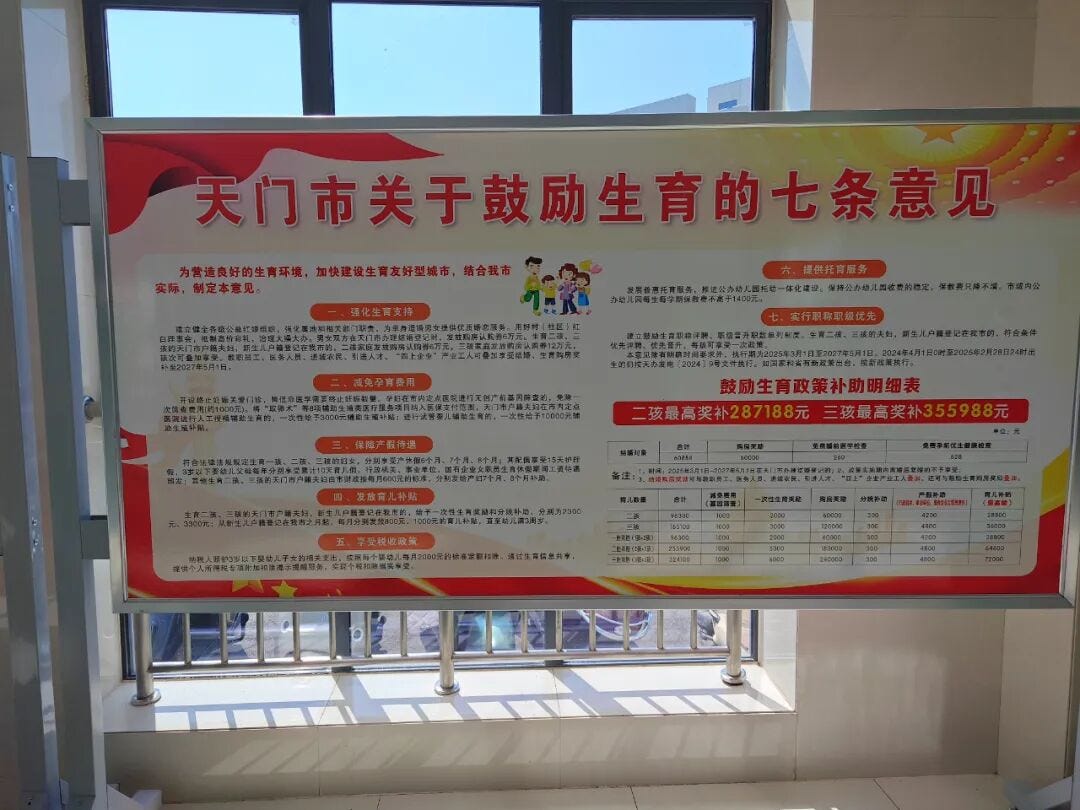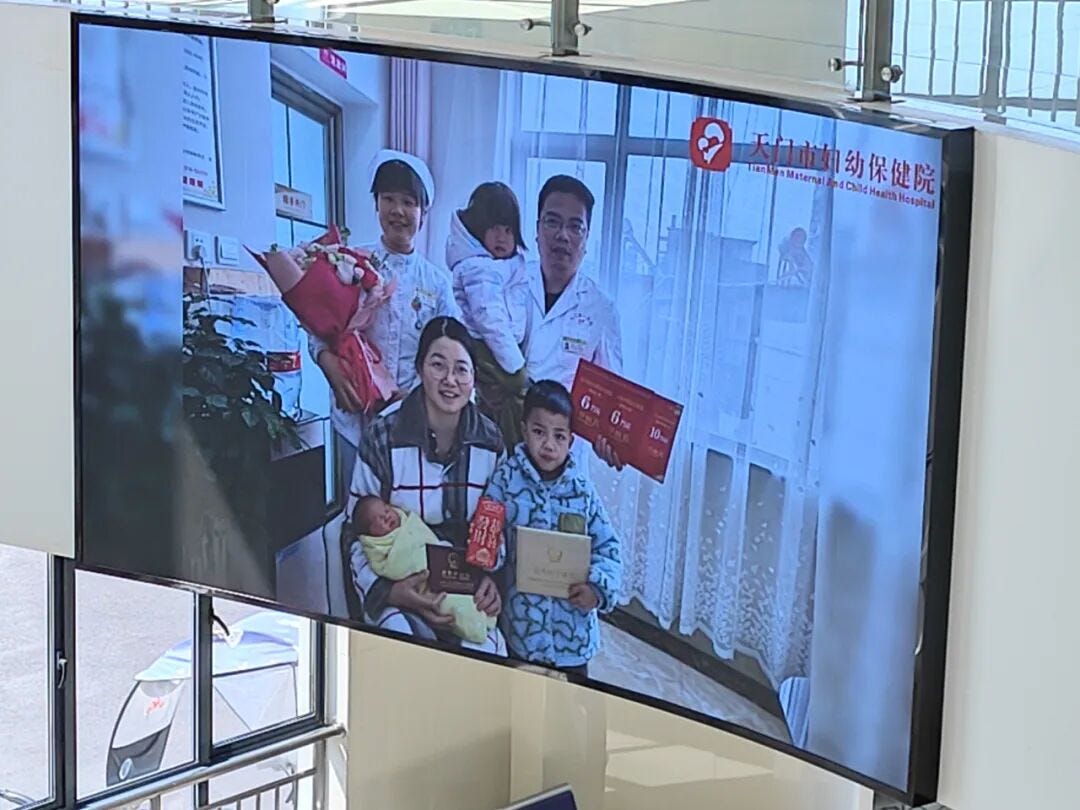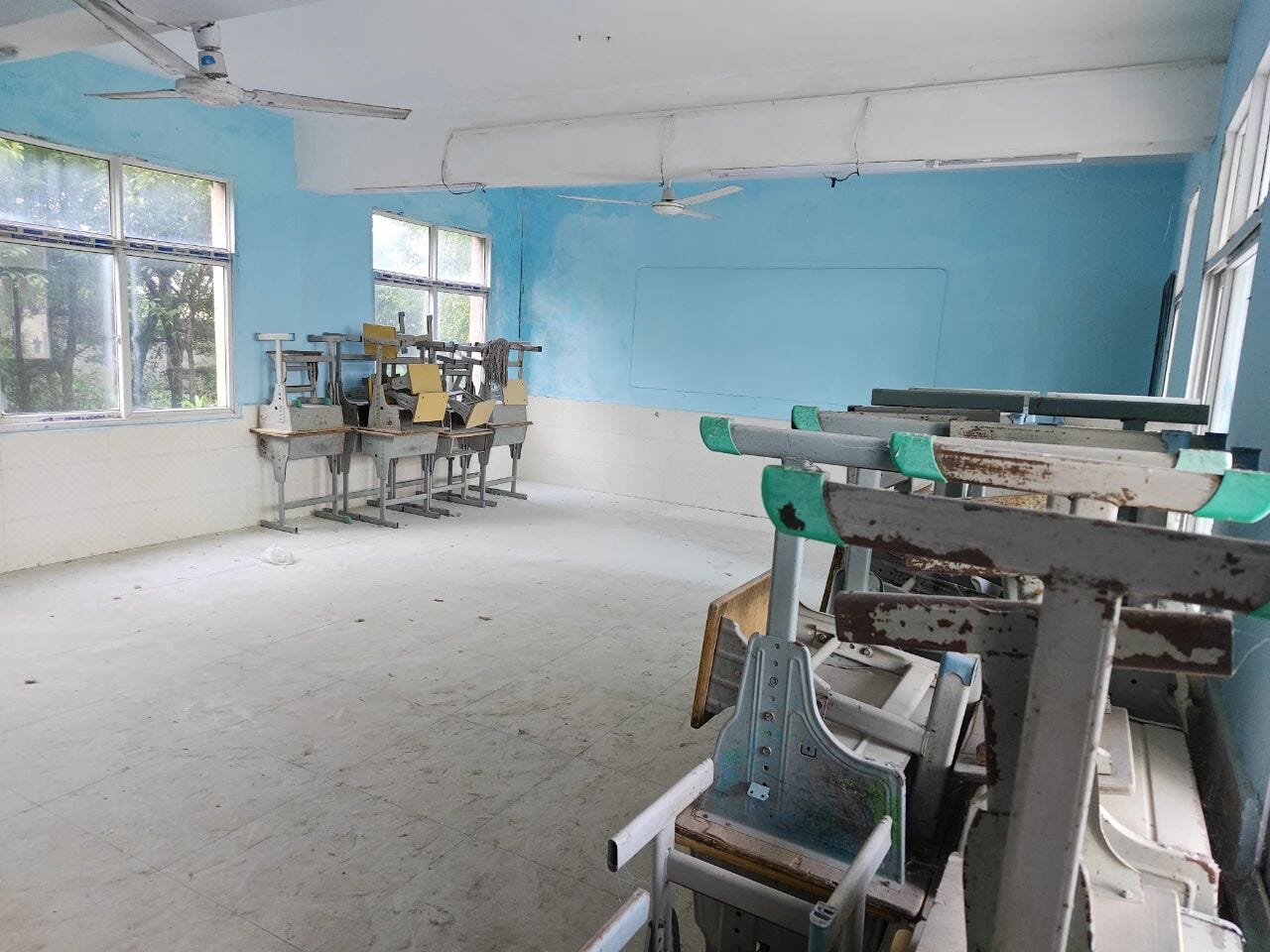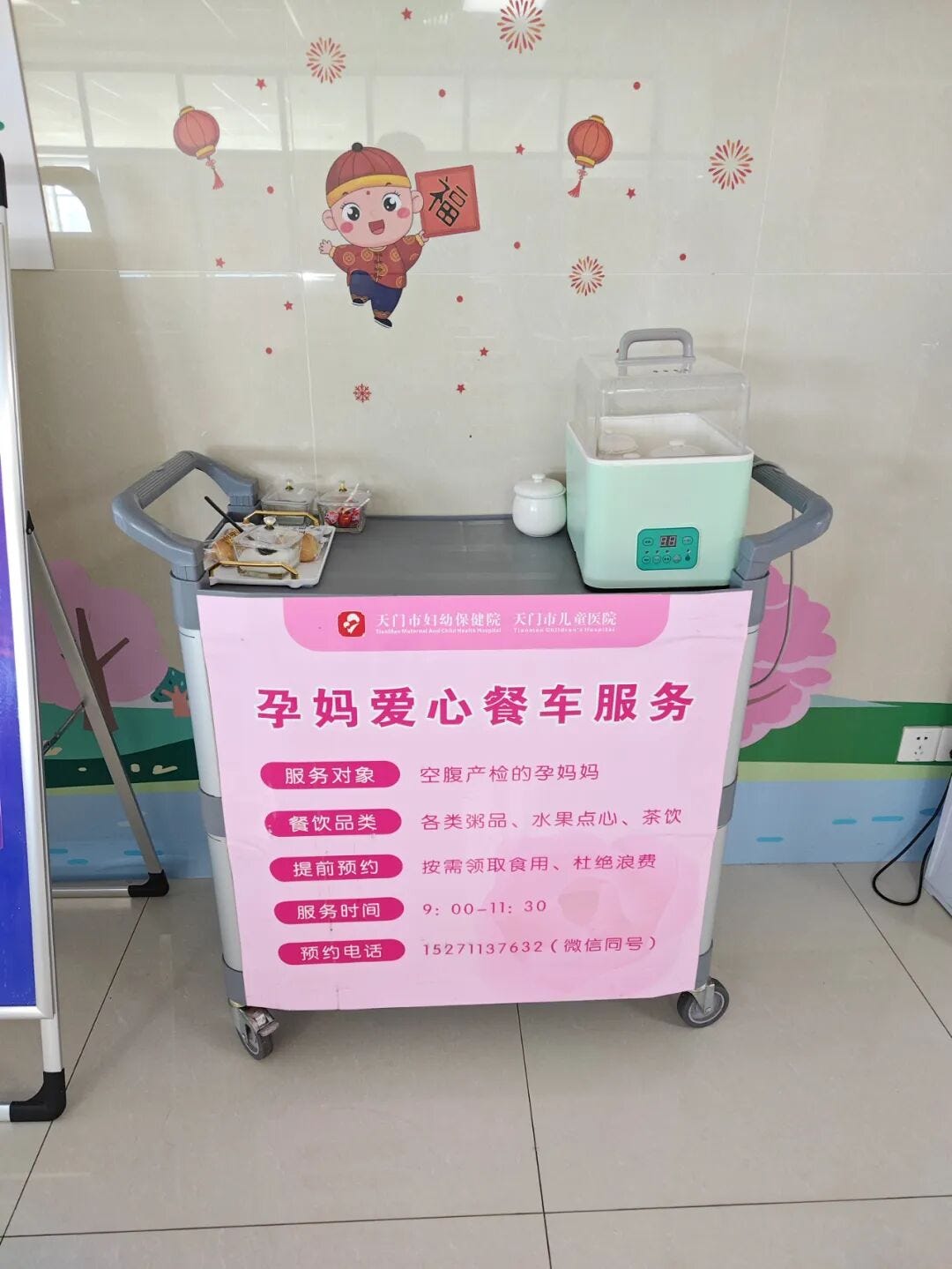A small Chinese city offers handsome cash to boost births. It worked.
In the face of a nationwide population crisis, the central Chinese city of Tianmen offers unprecedented cash incentives & subsidies to reverse its declining birth rates. The policy is working for now.
Can money change minds about children? A small city in central China is betting yes.
In 2024, Tianmen, the most aged city in Hubei Province, saw a surprising shift as its birth rate increased for the first time in eight years, up by 17%, far surpassing the national growth of 5.8%. This trend has continued into 2025, with a 5.6% increase in births in the first half of the year.
Much of this turnaround can be attributed to one thing: an exceptionally generous program of direct cash handouts, backed by determined and efficient implementation from local authorities. In Tianmen today, having a second baby could unlock up to $41,000, and a third could bring as much as $51,000.
This generous policy was born out of necessity. Over seven years, the city saw its number of newborns plummet by two-thirds, while more than 450,000 residents moved away. The revival in birth rates has also had a stabilizing effect on related industries, particularly real estate. In recent years, housing prices in Tianmen have remained stable.
However, concerns linger regarding the long-term sustainability of such hefty subsidies. In response to these doubts, Tianmen's top official, Ji Daoqing, noted in a piece:
From a social development perspective, people are the source of urban vitality. Economically, one child generates approximately 80 years of future consumption. Since implementing the fertility support package, Tianmen has sold over 10,000 housing units. Fiscal outlays for the policy accounted for less than 2% of the city’s general public budget in 2024, which is manageable.
从社会发展维度看,人口是城市活力的源泉。从经济发展维度看,一个孩子可拉动未来80年左右的消费。以商品房销售为例,天门市自实施一系列生育支持政策以来,已带动商品房销售过万套。而从实施生育支持政策“组合拳”的财政可承受能力看,2024年全市兑现的政策资金占当年一般公共预算收入的比例不到2%,财政可承受。
Ji further projected that between 2024 and 2026, Tianmen will invest over 300 million yuan in encouraging childbirth, expecting more than 3,000 additional births.
Yet, money is far from a panacea. Due to factors like local wage levels, many residents work in nearby Wuhan, the provincial capital. For these families, having a child in Tianmen often means navigating the difficulties of a long-distance commute.
There are no simple solutions to complex social problems. But at least for now, Tianmen's policy appears to be delivering. The city's experiment in incentivizing births serves as both a microcosm of the challenges faced by many small and mid-sized cities in China and a compelling case study for observing the contemporary puzzle of declining birth rates.
The following article was originally published on September 19 in the WeChat public account of Renwu/People 人物 magazine, under the title "When a City Pays to Encourage Births." The monthly publication, founded in 1980, is a biographical magazine published by the People's Publishing House.
The English translation is mine.
当一个城市花钱「催生」
When a city pays to encourage births
The Pro-birth City
If not for the push to boost births, Tianmen, a little-known small city, would draw scant attention.
Driving off the expressway into the city center, one will pass government offices and banks in aging buildings with peeling walls, much as many would picture a mid-central Chinese city. But follow Huiqiao Avenue and a building complex pops into view, which, for a moment, gives people the illusion of being in first-tier cities.
This complex houses Tianmen Children's Hospital, the Children's Wellness Center, and the Women and Children's Hospital. The buildings are new, the gateways wide, parking plentiful, and there's even a free playground on the plaza. The site covers 45,000 square meters, and it's still growing: a maternity care center and infant-toddler care facilities are being added.
Step inside and the "pro-birth" atmosphere is everywhere.
At the hospital entrance, a display board reads, "Girl or boy, each child brings joy; having both completes your family 男孩女孩都是宝,儿女双全就是好." Above it, a red LED scrolls, "Two or three makes a perfect family, policy perks are here to stay 二胎三胎好,政策到家把你找."
Inside, a 100-inch screen cycles through photos of families with two or three children posing alongside obstetricians. Everyone is smiling, some holding bouquets, others displaying household registration booklets or marriage certificates, and a few proudly presenting locally rewarded "home purchase vouchers."
On the second floor, a glass wall is adorned with red envelopes arranged in a heart shape. A few of them bear handwritten notes: "More children, more laughter," and "Happiness simplified: one, two, or three little ones. 幸福很简单,宝贝一二三."
Here, childbirth has been elevated to a civic mission—and under this dense pro-birth mood, some who were firmly decided otherwise have wavered.
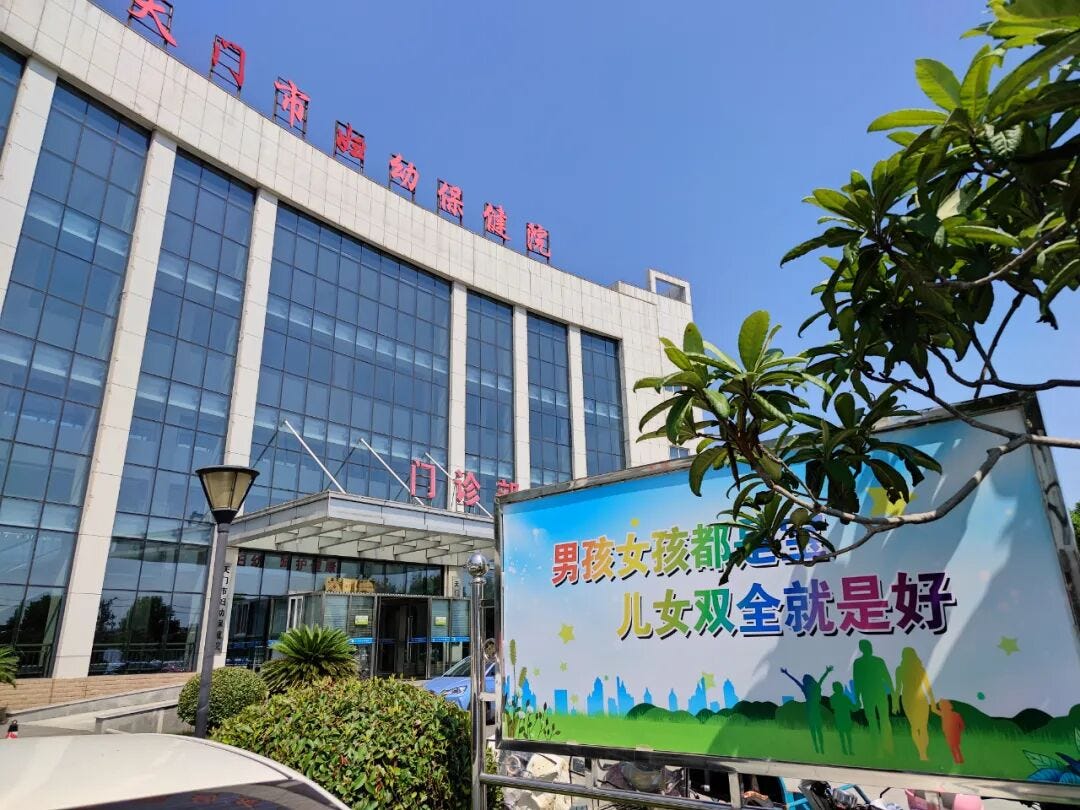
Having a second child was never in Zhou Man's life plan.
She is 33, holds a civil-service-track post in Tianmen, and has an 8-year-old daughter. "If I wanted a second, I'd have had one earlier. I wouldn't wait until I'm older," she said.
But since last year, the city's pro-birth drumbeat grew louder, especially inside the state apparatus. Every two months came a progress check; supervisors in charge of fertility work often pulled her aside to talk through the cash benefits she could claim, hinting that if she has another child, her future title promotion could be "given priority consideration."
As China Newsweek reported, "Take Tianmen First People's Hospital… From September 2023 to October 2024, over 13 months, hospital leaders, in recollection, conducted 27 rounds of mobilization urging target staffers to have children." Each leader kept a logbook of these conversations; top leaders even used lunch breaks to advocate at the table.
On fairness concerns around promotion, Tianmen's organization and HR authorities said promotions would add extra slots for families who give birth and would not squeeze others who qualify.
Faced with these policies, Zhou Man had mixed feelings. At home she bears the brunt of childcare. Having another child means living it all again; refusing might stall her "progress" at work.
In the end, she decided to try for a second child.
She conceived in the first half of this year. Besides her family, her immediate supervisor was the happiest — often reminding her to rest and take leave as needed. "I get it: this shows he's delivering on fertility targets."
The city's priorities show up in official paperwork too. On February 8, the Tianmen authority issued an "Implementation Opinion on Building a Fertility-Friendly City." It was sent to townships, sub-districts, Party offices, commissions and bureaus, and all affiliated public institutions. Over ten pages lay out how to grasp the childbirth agenda across the city.
Beyond policy design, Tianmen's biggest lever is cash. Stacking up subsidies and bonuses, a family having a second or third child can receive up to RMB 287,000 or RMB 355,000 in combined support, far above most other cities.
To publicize this, the local health commission printed a booklet, "Selected Cases of Fertility Incentives in Tianmen," freely available at hospitals. It prosents nine cases of post-birth rewards. The titles alone radiate "pro-birth enthusiasm":
"Tianmen Newlyweds: Marriage License in the Morning, House Purchase in the Afternoon", "New Mom Gets 70,000 yuan Reward, and a RMB 240,000 surprise", "Couple Registers Back Home with Child; Policy Benefits Arrive in Back-to-Back", "Tianmen's New Policy Warms Third-Child Families; Stacking Rewards Secure a New Home".
Under the Big Rewards
On the first floor of Tianmen Women and Children's Hospital, a "one-stop" service counter is staffed daily by police to handle newborn household registration so families don't have to shuttle between offices. Nearby is a special counter for issuing "Fertility Honor Cards."
This "Fertility Honor Card" is rare in other cities. It is essentially a bank card: if you give birth in Tianmen and meet the criteria, the delivery subsidy, the one-off birth reward, and the monthly childcare subsidy are all paid directly onto the card —withdraw anytime, spend as you wish.
On August 27, Zhang Xue, who just had her second child, had already received hers. Her first child is a boy; the second is a girl. Under policy, she had RMB 1,000 off a genetic screening, a one-off birth reward of RMB 2,000, a RMB 60,000 home-purchase reward, RMB 300 in delivery allowance, RMB 4,200 in maternity-leave allowance, and a monthly child-rearing subsidy of RMB 800 until the child turns 3.
She tallied it at roughly RMB 96,000. What she values most is the monthly RMB 800 cash: "It hits my card on time every month, more punctual than my salary." Wages in Tianmen aren't high. She's an accountant at a small local firm and barely makes 3,000 yuan a month, so an extra 800 yuan is a 25% raise. In her village, third-child mothers get more — 1000 yuan per month.
For third children, the home-purchase reward doubles to 120,000 yuan. Take "Guotou Jinxiu," a mid-to-upper-end development in central Tianmen: "Units go for about RMB 5,000 per square meter," a sales agent said. "Many buyers use the fertility subsidy as a down payment, add a little of their own and they can own the home." Zhang thinks this is one reason Tianmen's housing prices have stayed stable in recent years.
Housing statistics back some of this up. As pro-natal subsidies ramped, homebuying did pick up. In 2022, new-home sales fell hard year-on-year: 5,593 units and 664,700 square meters sold, down 30.08%. But both 2023 and 2024 saw rebounds: sales area and units each rose about 6%–8%. Inventory shrank from 10,631 units to 6,733.
Such two-year growth is uncommon among Hubei peers. Third-party data from Anjuke also align: from 2023 to 2025 , new-home prices in Tianmen hovered around 5,000 yuan per square meter.
Births don't happen in isolation; marriage comes first. Any couple registering their marriage in Tianmen between March 1, 2025 and May 1, 2027 can receive a RMB 60,000 home-purchase reward (remarriage after divorce excluded), plus free premarital and eugenic health checks. Rewards stack: marriage and childbearing bonuses can be combined; teachers, medical staff, rural-to-urban migrants, and talent recruits can layer on additional support to reach up to RMB 180,000 for a home.
To curb wedding-cost pressure on youth, in May 2024 the city issued an "Oppose High Bride Price" initiative to rein in lavish banquets and excessive dowries and to "encourage zero bride price to lighten love's load and enhance happiness."
The net is cast beyond residents too. Couples working elsewhere who are already pregnant are also tracked and urged to register their babies back in Tianmen.
In April 2024, Li Lei, who runs a clothing business in Guangzhou, got a call from his village Party secretary urging him to bring the baby's hukou back to Tianmen. His wife was 5 months pregnant with their second. Over the phone, the secretary itemized the benefits: a RMB 5,000 one-off birth reward, a RMB 300 delivery subsidy, a RMB 4,800 maternity-leave subsidy, and over RMB 1,800 per month in childcare stipends. On top of that, RMB 180,000 off on a home purchase. The sole condition: register the babies in Tianmen.
Li saw no reason to refuse, and he had to move fast, because each month of delay meant one less month of subsidy. The twins were born in August; by September 2, he had taken them back to Tianmen and used the subsidies to buy a 130-square-meter apartment.
The biggest haul went to Zhao Taotao and Zhang Mengmeng of Chenchang village, Fozishan town. They work in Guangdong and learned during a second-child checkup that they were having twins. Although they delivered at Dongguan People's Hospital in Guangdong Province, local cadres helped them register the twins in Tianmen, ultimately securing 314,900 yuan in subsidies, including 180,000 yuan for housing and 1,800 yuan per month in childcare (800 yuan for the second child and 1,000 yuan for the third).
They also qualified for a RMB 60,000 "rural-to-urban" homebuying subsidy—up to RMB 240,000 off in total (usable only in Tianmen). For the children's sake, they bought in a pricier area at about RMB 5,400 per square meter, right across from Tianmen Experimental Senior High School.
There are softer supports too: extended maternity and childcare leave, some tax relief, and a cap of RMB 1,400 per semester for public-kindergarten fees. The city also offers free 2-dose bivalent HPV vaccines to 14-year-old girls on a voluntary basis.
For those who need assisted reproduction, Tianmen includes procedures in basic medical insurance: RMB 3,000 one-off for intrauterine insemination, RMB 10,000 one-off for In Vitro Fertilization (IVF).
Other cities hand out money too: Hohhot offers RMB 50,000 for a second child; Hangzhou gives RMB 2,000 in pregnancy-birth support and RMB 5,000 in child-rearing support for a second child; Shenzhen has a one-time birth subsidy around RMB 10,000; Panzhihua pays RMB 500 monthly per second child. Nationally, the central government has rolled out a Child-Rearing Subsidy Implementation Plan: RMB 3,600 per child per year, paid annually.
But few match Tianmen's level of spending.
Demographic Bind
Tianmen's population crisis is palpable to most locals.
Sun Xuemei teaches at one of the city's best private middle schools. In the past, parents had to win a lottery to get in. "Our exam results were strong, sometimes the best in the city." At the peak, 700–800 families entered the lottery for 500 seats. This year, intake fell off a cliff: only 300 students enrolled; classes were cut; and filling seats took work. "Parents came in dribs and drabs," she said.
To recruit enough students, the principal did something unprecedented: sending teachers to villages to hand out flyers. Since last year, Sun has watched kindergartens and primary schools shut down one after another.
That raises her anxiety. "Public-school teachers have tenured posts; if a school closes, they can transfer. We in private schools don't. If this continues, where will we work?"
Teachers' shrinking pipelines are one facet of fewer births.
Wu Shuang, who has run an infant-products shop in Jiuzhen town for 20 years, has felt it too. "If I didn't own the storefront, I wouldn't still be here," she said. "The farther you go into the countryside, the fewer kids there are. Even if they have babies, they deliver in the city. Rural business keeps getting harder."
A decade ago it was the opposite: more children, more schools, brisk sales. "Now every sale counts."
Tianmen’s challenge isn't only fewer newborns; it's also rapid aging.
According to 2023 government data, 25.81% of residents are aged 60 and above, and 17.96% are 65 and above, the highest aging rate in Hubei Province. In barely a decade, the 60+ share has climbed from about 10% to over 25%.
At the same time, as "Hubei's most populous county-level city," Tianmen is losing people.
Young adults mostly leave for nearby Wuhan, the capital city of the Province. Whenever Xu Li returns home, walking downtown or visiting the locally largest Wanda Plaza, she notices: "You hardly see anyone in their 20s. It's mostly people in their 40s and 50s and grandparents with kids. The young are working elsewhere."
She and most of her classmates are out of town. "Those who stay either enter the public sector or take a random service job," she said.
City stats show household-registered population above 1.55 million but a resident population of only about 1.10 million, meaning over 450,000 Tianmen natives live and work elsewhere. Nearly one-third have moved away, concentrated in prime working ages.
In many ways, Tianmen's low birth rate and high aging mirror a national pattern — Tianmen's urgency is just more acute.
The numbers tell the story. Before the pro-natal pivot, newborns fell year after year. In 2016, Tianmen recorded 18,528 births; by 2023, after seven straight years of decline, the count hit a record low to just over 6,000, a two-thirds drop.
In 2024, one year into the new policies, births rose for the first time in eight years — 7,217 newborns, up 17% year-on-year.
The turnaround began with a citywide "fertility needs census" spanning 170,000 households. In an article in China Population News, Tianmen's top leader Ji Daoqing recalled that in 2023, he led a 400-plus-cadre special team to survey married women under 49 with one or two children via questionnaires and home visits. They found three core pain points: high child-rearing costs, insufficient leave protection, and housing pressure.
That same year, policy flipped pro-natal. The watershed was a September 2023 "Five Policy Measures to Encourage Childbearing." Back then, second-child families got only RMB 1,000 one-off and RMB 50,000 in home-purchase vouchers. Since then, the money increased, coverage expanded, and hukou restrictions were eased.
The Other Side of Childbirth
On paper, Tianmen's policies have produced some results. But fertility is not a problem money alone can solve.
Often, care and respect matter more than cash. On this, Tianmen Women's and Children's Hospital stands out.
Xu Li, who works in Wuhan, faced two choices for delivery: Wuhan or Tianmen. She chose Tianmen because both families live there and could help.
The hospital left her a deep impression. "The single rooms are huge. I paid just over RMB 150 a day. There were two beds, a long sofa and coffee table, enough seating for three or four, plus a private bathroom."
Epidural analgesia requires no scarce appointment as in some big-city hospitals. Her labor stretched from morning to night. The anesthesiologist in charge of the epidural stayed by her bed almost the whole time, "He was kind and reassuring. He stepped out once; when I called through the pain, he came back and adjusted the meds."
The hospital is spacious and uncrowded. She remembers in Wuhan, her husband circled the parking lot the entire prenatal visit and never found a space.
After delivery, nurses came four or five times a day to check recovery. She left with a bouquet, "I felt respected."
Many details show the focus on mothers: free maternal formula and snacks in the waiting areas; a jar of free lollipops to prevent hypoglycemia, common in pregnancy due to faster metabolism and hormonal shifts; even a warming box with sweet tremella-red-date soup, refillable by phone reservation if empty.
Locals also worry about whether subsidies are sustainable, and whether the Tianmen model can be replicated.
A mid-level bank manager, for instance, fears the burden on city finances. Though Tianmen has made the "CCID Top 100 Counties in China" list four years running and ranked number 100 nationally in 2024, its per-capita GDP is low for its population—933rd among all counties and county-level cities nationwide, and only mid-tier within Hubei Province.
But the city leaders are firm. In China Population News, Ji Daoqing did the math:
"From a social-development lens, people are the source of urban vitality. From an economic lens, one child drives roughly 80 years of future consumption. Take commercial housing: since rolling out the fertility-support package, Tianmen has seen over 10,000 units sold. As for fiscal capacity, in 2024 all policy outlays accounted for under 2% of general public budget revenue, which is fiscally affordable."
The article adds that from 2024 to 2026 the city expects to invest over RMB 300 million to encourage births, with over 3,000 additional births citywide.
Even so, many remain cautious.
Zhou Hui, a woman of childbearing age with one child, was invited to a fertility-promotion talk last year after the city's household-level census identified her family status.
"Over a hundred women came. A senior OB-GYN explained the benefits of a second child, detailed the subsidies, and also saying, for example, that having a sibling is good for a child," Zhou said.
She still isn't considering a second. For her, the mental load of parenting is heavier than the money. She and her husband work in Wuhan, the capital city of Hubei Province, and commute like migratory birds every weekend to Tianmen to care for their child, then back to work on Monday — a four-hour round trip including high-speed rail and city travel. It's exhausting, and they've already done it for half a year.
Subsidies alone aren't enough to make people stay. One mother who received childbirth subsidies shared that she used to work in Guangdong's garment industry but returned when Tianmen began boosting e-commerce and local factories started hiring. "The pay is slightly higher than Tianmen's average wage. As long as there are jobs, people will stay."
However, for those working in the capital city Wuhan, finding local jobs with comparable salaries remains extremely difficult. With limited options, they're forced to leave their children behind in Tianmen, traveling back by high-speed train every weekend to see them.
That's Zhou Hui's life. When her child was younger, Sunday departures barely registered. Now, every Sunday brings tears, and parting hurts them both. "We don't have a better fix," Zhou said. She and her husband often talk about the helplessness of this two-city life, and their guilt over not being around more.
She's run the numbers: when kids are small, formula costs aren't huge; with another baby, they could afford it, especially with subsidies. "But support stops at age 3. Later it's tutoring and all kinds of expenses — that's the real big stuff."
No subsidy can ease the emotional drain. Wang Zhi, 58, recently learned her son is due RMB 4,200 in birth allowances for the new baby.
She already has a 3-year-old grandson. The second grandchild reshuffled her retirement plans. She loves bright colors and novelty and had hoped to travel after retiring. But when she retired, the older boy was only 10 months. "I switched straight into caregiving. My daughter-in-law's mother passed away early, so it's all on me. I haven't had a day off since." Last year, she even developed tenosynovitis from carrying the child and had to undergo surgery.
She's not short on money; she's short on freedom. With both her son and daughter-in-law working in another city yet having specific expectations about child-rearing, she's solely responsible not only for the grandson's daily care but also for his education.
Within Tianmen's policy scope, she's neither a full supporter nor an opponent. "It's not about the money. It's the grind."
(All interviewees are identified by pseudonyms.)


